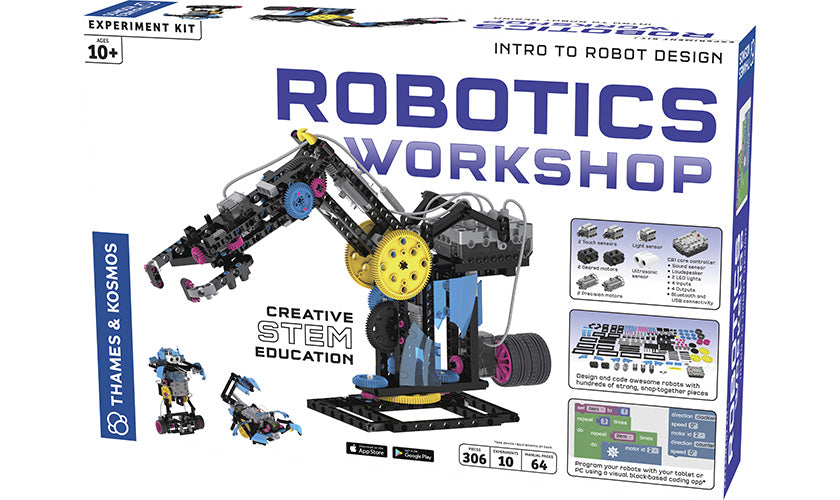Thames & Kosmos
Robotics Workshop
Robotics Workshop
Couldn't load pickup availability
Build and program robots with this complete robotics engineering system. Using sensors, motors, a core controller, and hundreds of snap-together building pieces, you can follow the instructions to assemble ten different robots. The versatile parts also allow you to make robots according to your own designs.
This fun robotics curriculum starts out with instructions for building simple robots, teaching you how the sensors can be used to control the robots. Build an ultrasound robot that can avoid obstacles, a drawing robot, and a touch sensor robot. Move on to more complex robots that have multiple functions, such as a ball-shooting robot, a crawling robot, and a grabbing robot. Build a robotic arm that can pick up objects, a butler robot, a robot that will turn toward a light source, and a cool scorpion robot.
After you have mastered all of the robotic models in the instructions, you will have the tools and knowledge you need to go on and build and program your own amazing robotic creations.
The robots can be controlled directly in realtime and programmed to perform series of commands using an easy-to-use, free downloadable app on iOS or Android® tablets and Windows PCs. The mobile app wirelessly connects to the core controller using a Bluetooth low energy connection. The PC app connects to the core controller via a USB cable. The app uses the open source visual block programming library Google Blockly to make coding fast and easy to understand.
A 64-page, full-color manual features step-by-step illustrated building instructions and instructions explaining how to program and operate all of the robot models.
Robotic Components:
Ultrasonic Sensor
Your robot’s eyes! The ultrasonic sensor helps your robots gauge distances and determine where objects are. Using the core controller, the ultrasonic sensor is able to detect an object and measure its proximity. Technically it works like a sonar system: a sound is sent out and received again when it bounces off obstacles.
Light Sensor
Detect light intensity! The light sensor assists in helping your robot to “see.” It enables your robot to distinguish between light and dark, as well as determine the light intensity in a room or the light intensity of different colors.
Touch Sensor
Your robot’s fingers! The touch sensor measures information arising from physical contact with objects, enabling your robotic creation to “feel” things in front of it! The sensor can detect single or multiple button presses, and reports back to the core controller, which decides what to do according to the program. The kit includes two touch sensors.
Precision Motor
Take precise steps! The two precision motors allow your robot to take accurate and powerful steps with complete motor control! The kit includes two servo motors.
Geared Motor
Drive your robots! The two geared motors bring motion to your robots: Connect the motors to gears, wheels, and other pieces to move your robots in many ways. The kit includes two regular motors.
CB1 Core Controller
Your robot’s brain, ears, and voice! The CB1 core controller wirelessly connects the app on your tablet to the motors, sensors, microphone, speaker, and LEDs.
Speaker
Your robot’s voice! The loudspeaker integrated into the core controller allows you to program your robots to make sounds.
Sound Sensor
Your robot’s ears! There is a microphone on the core controller that can detect sounds. You can program your robot to react accordingly. So if you clap your hands once, it can mean one thing, and it you clap twice, it can mean a different thing. The sound sensor is able to measure noise levels around 3–6 kHz, where the human ear is most sensitive.
You will also need: 6 AA batteries (1.5-volt, type AA/LR6) or 6 AA rechargeable batteries (1.2-volt, type AA, HR6/KR6); Tablet and/or PC with Internet access. To use an external DC power source, a 5V 2.5A DC power supply is recommended.
Tablet device requirements for app:
Smartphones are not supported. iOS devices must support Bluetooth 4.0 and must be running iOS 8 or later. iOS 9 or 10 is recommended. Supported devices include iPad 3rd generation or later, iPad mini iPad Air and iPad Pro. An iPad display of 9.7 inches or larger is recommended. Android devices must support Bluetooth 4.0 and must be running Android 5.0 or later. A display of 9.7 inches or larger is recommended. Due to the large number of Android devices on the market compatibility cannot be verified on all Android tablets. Contact us for a current list of compatible tablets.
PC requirements for desktop app:
The desktop app is not supported on all computers. A Windows desktop or laptop PC with USB 2.0/3.0 port and Internet connection are required. The CB1 Blockly Desktop application was developed on Windows 10. It is expected to work on Windows 7 or higher, but the compatibility cannot be verified on all computers. Minimum system requirements: Dual core processor, 2.4 GHz (i5 or i7 Intel processor or AMD equivalent); 4 GB RAM; 100 MB free hard drive space for the application files; 802.11g/n wireless (for laptops; WPA2 support required); 19-inch LCD monitor (for desktops)
Materials
Materials
Shipping & Returns
Shipping & Returns
Dimensions
Dimensions
Care Instructions
Care Instructions


